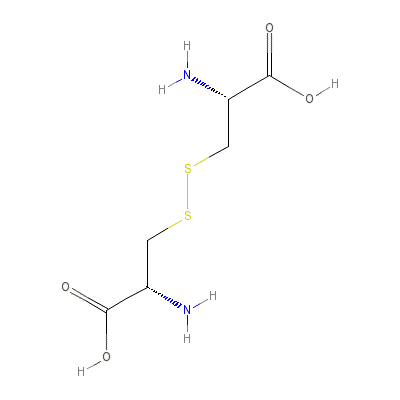L-alpha-Diamino-beta-dithiolactic acid




L-alpha-Diamino-beta-dithiolactic acid Brand names, L-alpha-Diamino-beta-dithiolactic acid Analogs
L-alpha-Diamino-beta-dithiolactic acid Brand Names Mixture
- No information avaliable
L-alpha-Diamino-beta-dithiolactic acid Chemical_Formula
C6H12N2O4S2
L-alpha-Diamino-beta-dithiolactic acid RX_link
No information avaliable
L-alpha-Diamino-beta-dithiolactic acid fda sheet
L-alpha-Diamino-beta-dithiolactic acid msds (material safety sheet)
L-alpha-Diamino-beta-dithiolactic acid Synthesis Reference
No information avaliable
L-alpha-Diamino-beta-dithiolactic acid Molecular Weight
240.0239 g/mol
L-alpha-Diamino-beta-dithiolactic acid Melting Point
260-261 oC
L-alpha-Diamino-beta-dithiolactic acid H2O Solubility
Soluble
L-alpha-Diamino-beta-dithiolactic acid State
Solid
L-alpha-Diamino-beta-dithiolactic acid LogP
-5.43
L-alpha-Diamino-beta-dithiolactic acid Dosage Forms
Capsules, injection, powder, tablets
L-alpha-Diamino-beta-dithiolactic acid Indication
It has been claimed that L-cysteine has anti-inflammatory properties, that it can protect against various toxins, and that it might be helpful in osteoarthritis and rheumatoid arthritis. More research will have to be done before L-cysteine can be indicated for any of these conditions. Research to date has mostly been in animal models.
L-alpha-Diamino-beta-dithiolactic acid Pharmacology
L-Cystine is a covalently linked dimeric nonessential amino acid formed by the oxidation of cysteine. Two molecules of cysteine are joined together by a disulfide bridge to form cystine. Cystine is a chemical substance which naturally occurs as a deposit in the urine, and can form a calculus (hard mineral formation) when deposited in the kidney. The compound produced when two cysteine molecules linked by a disulfide (S-S) bond. Cystine is required for proper vitamin B6 utilization and is also helpful in the healing of burns and wounds, breaking down mucus deposits in illnesses such as bronchitis as well as cystic fibrosis. Cysteine also assists in the supply of insulin to the pancreas, which is needed for the assimilation of sugars and starches. It increases the level of glutathione in the lungs, liver, kidneys and bone marrow, and this may have an anti-aging effect on the body by reducing age-spots etc.
L-alpha-Diamino-beta-dithiolactic acid Absorption
No information avaliable
L-alpha-Diamino-beta-dithiolactic acid side effects and Toxicity
With typical doses of 1 to 1.5 grams daily, the most commonly reported side effects have been gastrointestinal, such as nausea. There are rare reports of cystine renal stone formation, Single injections of L-cysteine (0.6-1.5 g/kg) into 4-day-old pups resulted in massive damage to cortical neurons, permanent retinal dystrophy, atrophy of the brain and hyperactivity.
L-alpha-Diamino-beta-dithiolactic acid Patient Information
No information avaliable
L-alpha-Diamino-beta-dithiolactic acid Organisms Affected
Humans and other mammals














